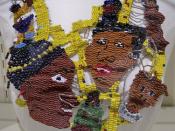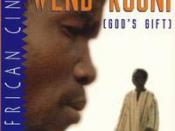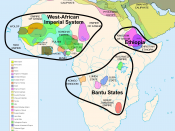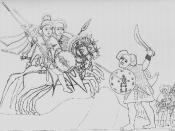Social Commentary in African Cinema The films we have viewed thus far this semester have been focused on a central idea, that of social change. There is an on-going struggle in African society. Many people call for a return to the old pre-colonial way of life, life before the white man. Others wish to embrace the white man's way of life and point out how much better African society is after colonialism. The films we have been watching illustrate this struggle. Many of the films are a call for social change. In this paper we will compare the view of modern African society in four of the films we have viewed this semester.
One of the earlier films we watched, Camp de Thiaroye, tells the tragic tale of African soldiers that have just returned from fighting the Germans in WWII. These soldiers are sent to a "transit camp"� where they wait to be shipped back to their home companies.
One of the soldiers has lost the ability to speak after spending two years in Buchenwald. It is the scene of him touching the barbwire with a very confusing look on his face that first clues the audience in that this is no transit camp. He cannot understand the difference between this and the German internment camp, and why should he? There is none. One of the other soldiers tries to explain to him that they are on African soil, but it is still a prison. The soldiers are allowed as much freedom as is necessary to keep them subdued, but the French are really holding them there because they do not know what to do with them.
While these men were fighting they gained confidence. They defeated the Germans, so why should they put up with the French? They refuse to abide by the class system that is inherent in the camp. Meat is for white men only. They are forced to sleep in shabby cabins, while the white men have private quarters. They have to turn in their uniforms in exchange for those of the African colonial infantry. Slowly, but surely the white French try to put to exert their dominance over the Africans. The final blow comes when the French refuse to exchange the soldiers' money at the normal rate. The soldiers will not stand for this, and take the general hostage. The French lie and say they will exchange the money fairly in order to secure his release. They then massacre the soldiers and level the camp with tanks. This is what they really wanted to do all along, and now they had an excuse.
The next scene shows more Africans leaving for military duty. The camera focuses on one of the soldier's uncles who has brought coffee for him, but the soldier is not there because he is dead. The camera then zooms in on the bag of coffee and a doll, which is the final image in the film.
This film is trying to call attention to the mistreatment of Africa by the colonial powers. When European countries controlled the African continent they literally raped it of all its resources, with absolutely no consideration for the African people. Not only did they take Africa's natural resources and manufactured goods, but also they took its people when they needed them. They needed soldiers, and Africa, with its abundant population, was the place to get them. They used them, and when they were finished with them, they simply threw them away.
The final scene of the film calls attention to the fact that this same sort of thing is still happening today. Coffee and many other products are still exported worldwide, and yet most of Africa still lives in poverty. The world wants Africa for what it can produce, but does not want to help with its problems. This being the fact many Africans are calling for a return to simpler ways of life, but some of the films we viewed this semester warned against such a things.
Wend Kuuni, with its almost-documentary representation of life before the white man, on the surface seems to call for a return to this way of life, but upon deeper examination turns out to be exactly the opposite. It is a warning. This film is saying that things may have been simpler before the white man came, but society as a whole is better having been influenced by whites.
This film points out the plight of women before colonization. There is clear double standard in the way Wend and his sister, Poguere, are treated. Wend is sent out in to the field to look after the family herd. Poguere is not allowed in the field. She is to stay home where her mother teaches her the things she will need to know when she gets married. When a woman gets married she has even less power. She becomes the property of her husband, who can do with her what he pleases. In one scene in the film we see a young woman who no longer wishes to be with her old husband. She is not allowed to divorce him. She berates him in the marketplace, and the shame the man feels for not having control over his wife is so great that he takes his own life. This film also shows the resentment the women of this time period must have felt. Wend's mother runs away rather than marry another husband. The woman in the marketplace very loudly sounds her resentment for being forced to stay married to her husband.
This film is in no way trying to say that Africa should turn away from its heritage. It is trying to point out that pre-colonial life in Africa was not perfect for everyone, and completely returning to such ways would do more harm than good. This film is saying that a return to the pre-colonial ways of life would not fix Africa's problems; it would only undo some of the good that has been done so far.
Another film we watched, Tilai, shows a society much like that in Wend Kuuni. This film shows a pre-colonial African society that desperately needs to change, but is unable to do so. As a result, it self-destructs. This film is a struggle between the young people, who want things to change, and the old people who refuse to let them do so.
In this film Saga returns from a long journey to find his bride-to-be, Nogma, married to his father. He is unable to accept this and decides to leave the village and live in a small hut away from his family. The village as a whole is unable to understand that Nogma and Saga are in love, and, despite traditional ways, they refuse to accept what has happened to them. When they commit adultery the village demands Saga's death, and Nogma's father is so disgraced that he takes his own life. The village sends Saga's brother, Kougri, to kill him. Kougri, being young finds it hard to understand the old ways when they call for him to kill his own brother. As a result he lets Saga live as long as he promises never to return to the village. In the end, however, Saga returns to the village to see his mother who has fell ill. Kougri is so shamed by his own father who banishes him, that he gives in to the old ways and kills his brother.
This film is a warning about societies that refuse to change. Any society has rules, and these rules usually work well for a while, but there comes a time when rules must be changed. When a society adheres so strictly to its own rules that there is no room for leniency, understanding, and compassion it is destined to fail. I feel this film is also making a comment about modern African society. Something needs to be done; it is time for a change, but returning to pre-colonial ways is not what Africa needs. The film urges Africans to move forward, not backward. I think this film is trying to say that modern African society is destroying itself in the same way that pre-colonial African society was doing. Only by moving forward will any real social change occur.
While most of the films we have viewed so far have called for social change, one film embraced modern African society with open arms. La vie est belle paints a colorful portrait of African urban culture. The society in this film is a combination of pre-colonial customs and the trappings of modern society. This film tells the story of a village musician who comes to the city to make it big. While there he encounters many of the city's most colorful personalities. The citizens of this city live in a society where old world traditions such as magic go hand-in-hand with such modern things as automobiles and nightclubs.
This film was not meant as social commentary; it was meant to give the African viewer hope for the future. Instead of juxtaposing pre and post-colonial ways of life, it showed how the two could live in harmony. This film was a modern day fairy tale which had a happy ending: Kourou got to be a star, he got to be with the girl he loved, and everyone lived happily ever after. I think the message of this film was that the only way modern African society could succeed was by remembering their past while embracing the future. You cannot totally abandon your past because it is what got you where you are now, but at the same time you must constantly look towards the future in order to further advance yourself.
In colonial times Africa was abused by her colonizers, and that abuse continues to this day. As a result, there is a strong calling to give up the ways of the white man and return to simpler times. Many African filmmakers warn against doing such a thing, as the end result would do more harm than good. Although the white man brought a lot of troubles with him, he also brought some good as well. The quality of life for women is definitely better in post-colonial days. At the same time Africans cannot totally forget their heritage. To do so would be foolish. They need to remember the lessons they learned in their past in order to succeed in the future. Above all, they must not loose hope. If they do so they are doomed.





